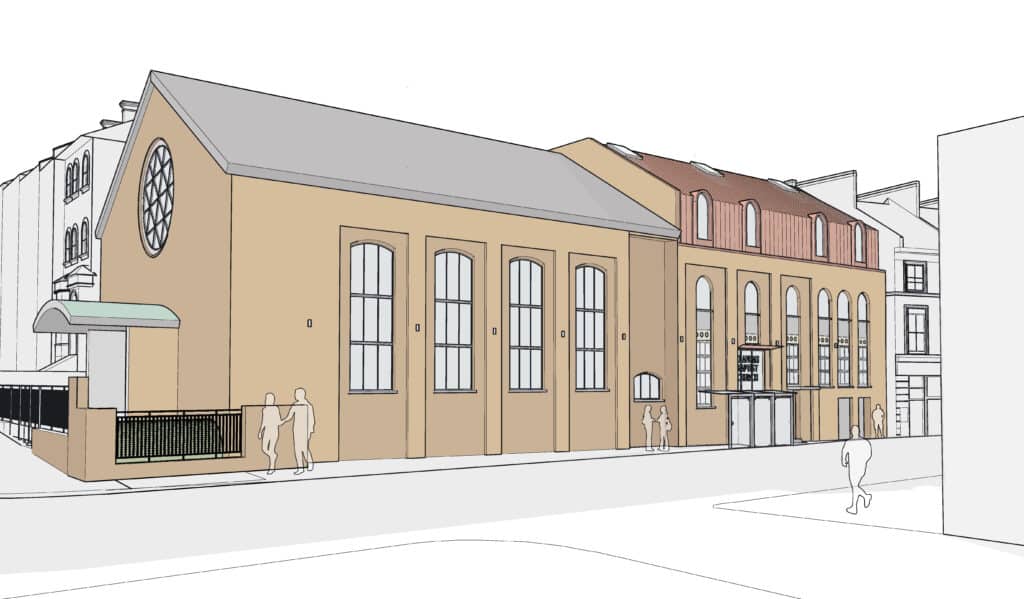08.08.2022 Why I set up a charity, by Mark Potter
August 8, 2022
The housing crisis in the UK is getting worse.
As both an architect and a man of faith, I get to experience two rather different worlds, both of which have brought this issue into sharp focus for me over the years.

Through my job as an architect, I find myself analysing spaces – buildings, land – that are being underused, looking for ways to get more from them, to maximise their potential. Meanwhile, as someone who takes a very active role in my church, I am part of a vibrant community that offers support to people from all walks of life in a diverse pocket of South London. It dawned on me, that by combining the experiences of both, there could be a way to make a useful and significant contribution to overcoming the housing crisis.
The Church Land Trust became a registered charity mid last year and we hope to be able to play our part in improving the issues surrounding social housing today.
Building communities not just cheap housing
The obvious and easy solution is to use church land for those in housing need. But this is not about simply building large volumes of cheap housing on church land. Our ambition is to build and grow communities. We want to focus on helping churches unlock the potential of their land to help their local community, while also growing a support network (another community, really) through The Church Land Trust to encourage and inspire more churches to do the same. But how will building communities like this – not just cheap housing – really make a difference?
When it comes to building a community, churches are a great place to start – they are by their very nature a ready-made community, both in terms of their congregation but also in terms of the community spaces church buildings are so often used as. By combining these spaces with social housing you can create a really inspiring, supportive place to live for those in housing need, such as ex-offenders, those just coming out of homelessness and those with mental health problems.
More than a roof over their head
It is about helping these people build a life, giving them better opportunities and a chance to feel part of something. Simply building cheap housing out in the middle of nowhere, with no support network, is just a sticky plaster and it does nothing to address the reasons why people might need social housing in the first place.
By offering housing within an already vibrant community, where there are spaces for you to meet likeminded people, as well as people who can offer help and support, laughter, skills, exercise (all of which are offered in classes held in church halls up and down the country), the chances of people experiencing real, long term change for the better are far greater. It is about elevating community housing and about creating a new model for social housing, beyond just building cheap homes.
A lack of proper resourcing holds churches back
But why has this not happened already? Why haven’t churches been able to achieve this before? Over the last 10 years, I have done at least a dozen or so studies for churches, looking at how they can realise the true potential of their land assets for themselves and for their community. But nothing has ever happened.
The issue here is simply because church land owners are not properly resourced to drive these projects forward. They may have the vision, they may have the people but through no fault of their own they just do not know where to start. Why would they? These are often big projects, they can be quite complicated and involve lots of different people. It is no surprise then that it is often just too much to think about. This is where The Church Land Trust comes in.
The power of open source to inspire change
Yes, the idea of using church land in this way is certainly gaining momentum within church communities, but there is currently no centralised recording of what is going on – this is what The Church Land Trust will offer. We want to be a holder of knowledge from across the faith groupings, so we can inspire people to do more. We want to use our experience to be an enabler to unlock the potential of these latent church properties and of the surrounding land.
We want to offer really good examples to illustrate what can be achieved and guide churches on the resources needed – both in terms of the expertise and materials – to get a project off the ground. And of course look at genuine funding opportunities to help with costs. We want to arm churches with all the information they need – and the confidence – to make these projects a reality.
When we go live later this year, we will offer a free initial online consultation to guide people on how to start. All our data will be completely open source. All the knowledge and experience we harvest and accumulate will be open to all and we will encourage people to share their success stories. Together with this community, we want to explore just how much can be achieved and hope that we can help overcome the current housing crisis.
